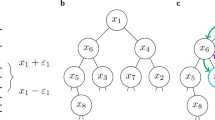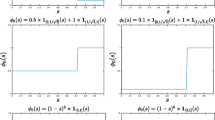Abstract.
We study the effects of diffusing opinions on the Deffuant et al. model for continuous opinion dynamics. Individuals are given the opportunity to change their opinion, with a given probability, to a randomly selected opinion inside an interval centered around the present opinion. We show that diffusion induces an order-disorder transition. In the disordered state the opinion distribution tends to be uniform, while for the ordered state a set of well defined opinion clusters are formed, although with some opinion spread inside them. If the diffusion jumps are not large, clusters coalesce, so that weak diffusion favors opinion consensus. A master equation for the process described above is presented. We find that the master equation and the Monte Carlo simulations do not always agree due to finite-size induced fluctuations. Using a linear stability analysis we can derive approximate conditions for the transition between opinion clusters and the disordered state. The linear stability analysis is compared with Monte Carlo simulations. Novel interesting phenomena are analyzed.
Similar content being viewed by others
References
C. Castellano, S. Fortunato, V. Loreto, Rev. Mod. Phys. 81, 591 (2009)
S. Galam, Eur. Phys. J. B 25, 403 (2002)
K. Sznajd-Weron, J. Sznajd, Int. J. Mod. Phys. C 11, 1157 (2000)
F. Schweitzer, J. Holyst, Eur. Phys. J. B 15, 723 (2000)
J. Lorenz, Int. J. Mod. Phys. C 18, 1819 (2007)
G. Deffuant, D. Neu, F. Amblard, G. Weisbuch, Advs. Compl. Syst. 3, 87 (2000)
G. Weisbuch, G. Deffuant, F. Amblard, J.P. Nadal, Complexity 7, 855 (2002)
G. Weisbuch, G. Deffuant, F. Amblard, Physica A 353, 555 (2005)
R. Hegselmann, U. Krause, J. Artif. Soc. Soc. Simul. 5, 2 (2002)
B. Düring, P. Markowich, J.F. Pietschmann, M.T. Wolfram, Proc. R. Soc. Lond. A 465, 3687 (2009)
R. Axelrod, J. Confl. Resolut. 41, 203 (1997)
M. Granovetter, Am. J. Sociol. 83, 1420, (1978)
M. Pineda, R. Toral, E. Hernández-García, J. Stat. Mech. P08001 (2009)
E. Ben-Naim, P.L. Krapivsky, S. Redner, Physica D 183, 190 (2003)
A. Puglisi, V. Loreto, U. Marini Bettolo Marconi, A. Vulpiani, Phys. Rev. E 59, 5582 (1999)
R. Toral, J.C. Tessone, Commun. Comput. Phys. 2, 177 (2007)
Author information
Authors and Affiliations
Corresponding author
Rights and permissions
About this article
Cite this article
Pineda, M., Toral, R. & Hernández-García, E. Diffusing opinions in bounded confidence processes. Eur. Phys. J. D 62, 109–117 (2011). https://doi.org/10.1140/epjd/e2010-00227-0
Received:
Revised:
Published:
Issue Date:
DOI: https://doi.org/10.1140/epjd/e2010-00227-0




